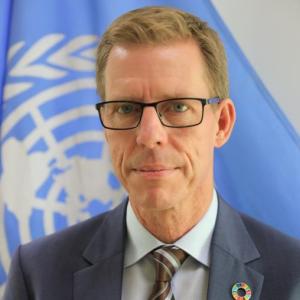Thank you, all, for joining us today to commemorate World Humanitarian Day.
Annually we come together on this day, to honour humanitarian workers around the world who are risking their lives every day to serve the humanitarian cause. And pay tribute to all humanitarian workers who have lost their lives while on the front lines of war and disasters.
This day of commemoration was started after the 2003 bombing of the Canal Hotel in Baghdad, where humanitarians were targeted and killed. On that day 22 humanitarian workers were killed, including Sergio Viera de Mello.
Five years later, the General Assembly adopted a resolution designating 19 August as World Humanitarian Day.
Each year, World Humanitarian Day focuses on a theme, bringing together partners from across the humanitarian system to advocate for the survival, well-being and dignity of people affected by crises, and for the safety and security of aid workers.
This year, we highlight the immediate human cost of the climate crisis.
I think many of us have followed the news over the last months showing the erratic and increasing number of natural hazards, where droughts, fires and severe flooding have impacted continents and countries around the world, resulting in loss of lives, displacements, and tremendous damages.
According to the Global Report on Internal Displacement of 2021, the number of people worldwide living in internal displacement has reached a record 55 million as of 31 December 2020. Of these, not less than seven million have been uprooted by disasters, and given the incomplete data this is likely to be a significant underestimate.
In Jordan, I don’t believe we have climate-related displacement. Not yet, you may say. But given water scarcity, and decertification, such a scenario cannot be ruled out.
Responding to climate change is a shared responsibility. We must call on all countries and world leaders to come to COP26, at the latest, to come to the table committed to do much more, to be ambitious. The IPCC report released on 9 August was referred to by the UN Secretary-General as a code red for humanity:
“The alarm bells are deafening, and the evidence is irrefutable: greenhouse gas emissions from fossil fuel burning and deforestation are choking our planet and putting billions of people at immediate risk. Global heating is affecting every region on Earth, with many of the changes becoming irreversible. We are at imminent risk of hitting 1.5 degrees in the near term. The only way to prevent exceeding this threshold is by urgently stepping up our efforts, and pursuing the most ambitious path.”
The reality is that time is already running out for millions of the world’s most vulnerable people – that is to say, those who have contributed least to the global climate emergency but are hit the hardest. Millions of people are already losing their homes, their livelihoods and their lives.
The climate emergency is wreaking havoc across the world at a scale that the humanitarian community is being hard pressed to respond to – and so we must also take this moment to reflect and understand what the future will look like for humanitarians and their brave efforts. And what our contribution, as institutions and as world citizens, can be.
To end with the words of the Secretary-General: “Climate race is a race we are loosing. But it is a race we can and must win.” By the way, I have already put on my running shoes…
Thank you


